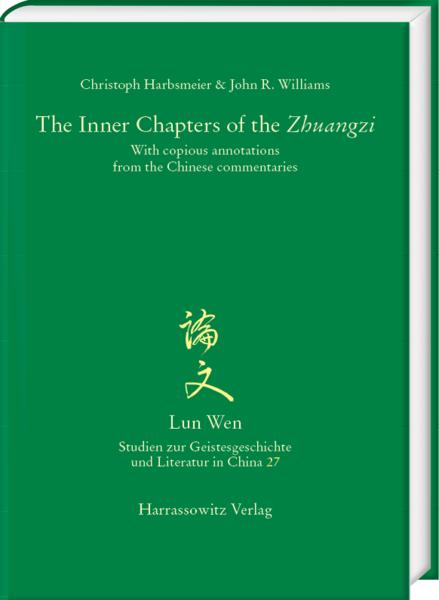

何莫邪、黎江伯著《莊子內篇匯評詮釋》
Christoph Harbsmeier and John R. Williams, The Inner Chapters of the Zhuangzi: With Copious Annotations from the Chinese Commentaries

Wiesbaden: Harrassowitz Verlag (2024)
作者簡介
何莫邪(Christoph Harbsmeier )
是奧斯陸大學的榮休教授,同時也是北京大學、復旦大學(上海)、武漢大學、浙江大學、上海師範大學和華東師範大學的名譽教授。他是「漢語詞庫」(Thesaurus Linguae Sericae,簡稱TLS)項目的創始人和協調人。他的主要研究興趣在於中國概念史和歷史語言學,但他也在科學史領域進行研究,並為由李約瑟編輯的《中國的科學與文明》系列書籍撰寫了第七卷《中國傳統語言與邏輯》(1998年)。
黎江伯(John R.Williams)
現任香港中文大學(深圳)講師,近期入選深圳孔雀人才計劃。他於新加坡國立大學獲得中國哲學博士學位,曾獲校長研究生獎學金,并曾在臺灣大學國際華語研習所進修。他專攻中國哲學,尤其專注於《莊子》的傳統詮釋與文學批評研究。其博士論文深入探討了明末清初思想家方以智(1611-1671)的莊學闡釋《藥地炮莊》。他的研究興趣涵蓋了郭象(252-312)、王夫之(1619-1692)等哲學家對《莊子》的哲學解讀,以及林希逸(1193-1271)、林雲銘( 1628-1697)、宣穎(約1721年活躍)、劉鳳苞(1826-1905)等學者的文學批評。
Authours
Christoph Harbsmeier (何莫邪)
He is Professor Emeritus of Chinese at the University of Oslo and also Honorary Professor at the Universities of Beijing, Fudan (Shanghai), Wuhan and Zhejiang as well as the Shanghai Normal University and the East China Normal University. He is the founding father and coordinator of the Thesaurus Linguae Sericae (TLS) project. His main research interests lie in Chinese conceptual history and historical linguistics, but he also conducts research in the field of the history of science, for which he has written the 7th volume of the series Science and Civilization in China, edited by Joseph Needham, on the topic “Language and Logic in Traditional China” (1998).
John R.Williams (黎江伯)
He is currently a lecturer at the Chinese University of Hong Kong, Shenzhen, and was recently selected for the Shenzhen Peacock Talent Program. He obtained his Ph.D. in Chinese Philosophy from the National University of Singapore, where he was awarded the President's Graduate Fellowship. Additionally, he has studied at the International Chinese Language Program at Taiwan University. His expertise lies in Chinese philosophy, with a particular focus on traditional interpretations and literary criticism of the Zhuangzi. His doctoral dissertation is a study of Fang Yizhi’s Yaodi pao Zhuang, exploring the Zhuangzi interpretations by the late Ming and early Qing thinker Fang Yizhi (1611-1671). His research interests include the philosophical interpretations of the Zhuangzi by thinkers such as Guo Xiang (252-312) and Wang Fuzhi (1619-1692), as well as the literary criticism of scholars like Lin Xiyi (1193-1271), Lin Yunming (1628-1697), Xuan Ying (fl. 1721), and Liu Fengbao (1826-1905).
內容簡介
本書首次以雙語對照的形式呈現《莊子》內篇核心章節。《莊子》是中國思想史和文學史上最著名的經典之一。本書的特色是在翻譯中遵循原文的節奏和韻律,使讀者能夠體驗這位最激動人心的古代中國哲學家的獨特風格。
本書導言從歷史和文學的角度詳細闡釋了這一經典,並重點講述了中國人如何欣賞和評論它,以及歷代學者如何將它翻譯成各種外語。書中提供了大量腳註,使讀者能夠通過熱衷於註釋它的歷代中國評論家們的視角來閱讀它:中國傳統學者的文學和哲學評論以古典中文原文和翻譯的形式得到呈現。
對於一般讀者來說,本書將提供一個難得的機會,讓他們跟隨中國最偉大的文人鑑賞家們,用哲學和文獻學視角審視全世界最為大膽非凡的經典之一。
對於正在學習中、英文的讀者來說,本書是一座雙語寶庫,用古典語言討論了這部古代中國道家傳統中備受爭議的重要經典。
Overview
This book is the first interlinear bilingual edition of the core Inner Chapters of the book Zhuangzi, which must be counted among the most famous texts in Chinese intellectual and literary history. A special feature of this edition is that it follows the specific rhythm and rhyme of the text in the translation, making it possible to experience the particular style of this most exciting of the ancient Chinese philosophers.
An extensive introduction explains the history and the literary nature of the text, and in particular it tells the story of how this text was appreciated and commented upon in China and translated into foreign languages through the ages. Extensive footnotes are provided to enable readers to read the text through the eyes of the enthusiastic Chinese commentators who have annotated the text over the centuries: traditional Chinese literary as well as philosophical commentaries are presented in detail in the original classical Chinese and in translation.
For the general reader this book will offer a rare opportunity to approach one of the most outrageously unconventional texts of world literature with the philosophical and philological perspectives of the greatest of its literate Chinese connoisseurs.
For the student of Chinese and English this book will serve as a bilingual cornucopia of spirited classical Chinese discourse on a fiercely contested and always controversially discussed crucial text in the Daoist tradition of ancient China.
目錄
致謝xi
導論
導論001
傳記004
作者身份與真偽007
《莊子》中的思想單元010
語體類型:寓言與比喻012
元哲學013
早期接受史014
編輯的起源019
注釋020
傳統020
欣賞性文學批評評點023
宋代的轉折及後續傳統025
流行的刻板印象033
比較視角037
敘事智慧文學037
寓言038
動物寓言039
翻譯
縮寫041
底本041
第1章:逍遙遊043
第2章:齊物論063
第3章:養生主096
第4章:人間世106
第5章:德充符139
第6章:大宗師160
第7章:應帝王193
附錄
附錄I:翻譯209
附錄II:傳統的前言224
郭象(約252–312), “序” 224
郭象, “後序” (保存在日本) 227
陸德明(約556–627), “序” 228
成玄英(約608–669), “序” 231
術語表235
參考文獻239
Contents
Acknowledgements xi
Introduction
General Introduction 001
Biography 004
Authorship and Authenticity 007 Units of Thought in the Zhuangzi 010
Speech Genres: Parables and Metaphors 012 Metaphilosophy 013
Early Reception History 014 Editorial Genesis 019
Commentaries 020
Traditional 020
Appreciative Literary Criticism 評點023
The Song Dynasty Turn and Subsequent Tradition 025 Prevalent Stereotypes 033
Comparative Perspectives 037 Narrative Wisdom Literature 037 Parables 038
Animal Fables 039
Translation
Abbreviations 041
Base Text 041
Chapter 1: 逍遙遊Roving Unbound 043
Chapter 2: 齊物論A Disquisition That Levels All 063 Chapter 3: 養生主The Essentials in Nourishing Life 096 Chapter 4: 人間世In the World of Man 106
Chapter 5: 德充符The Verification of Consummate Virtue 139
Chapter 6: 大宗師The Mentor of the Great Fundamental Inspiration 160 Chapter 7: 應帝王Responding to Being Emperors and Kings 193
Appendices
Appendix I: Translations 209
Appendix II: Traditional Paratexts 224
Guo Xiang 郭象 (c. 252–312), “Preface” 序224
Guo Xiang, “Postface” (Preserved in Japan) 227
Lu Deming 陸德明(c. 556–627), “Preface” 序228
Cheng Xuanying 成玄英(c. 608–669), “Preface” 序231
Glossary 235
Bibliography 239
(來源:黎江伯、呂陳童)